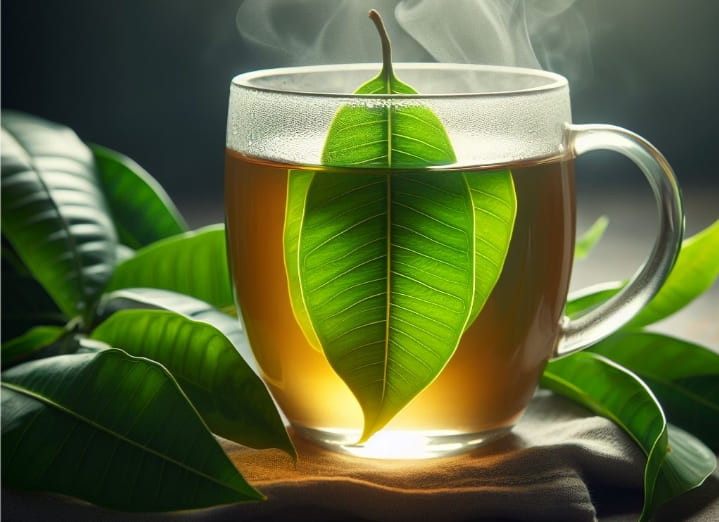
Mangoes, often celebrated for their succulent fruit, have yet another hidden treasure – their leaves. Mango leaves, botanically known as Mangifera indica, are derived from the mango tree, a tropical evergreen native to South Asia.
These leaves have been traditionally utilized in various folk medicine practices, revered for their therapeutic potential.
One of the most popular ways to unlock their potential is by brewing mango leaves tea. In this comprehensive guide, we will dive into the numerous health benefits of mango leaves tea, the steps to prepare it, and why it deserves a special place in your daily wellness routine.
The Nutritional Value of Mango Leaves
Before exploring the specific benefits of mango leaves tea, let’s uncover the nutritional components of these leaves. Mango leaves are not typically consumed as a primary source of nutrients, but they contain several bioactive compounds and essential nutrients, including:
1. Vitamins:
- Vitamin A: Mango leaves contain vitamin A, which is essential for maintaining healthy vision, promoting skin health, and supporting the immune system.
- Vitamin C: These leaves also provide a moderate amount of vitamin C, an antioxidant vital for immune function and skin health.
- B Vitamins: Mango leaves offer a range of B vitamins, including B1 (thiamine), B2 (riboflavin), B3 (niacin), B6 (pyridoxine), and B9 (folate). These vitamins play critical roles in energy metabolism, brain function, and the production of red blood cells.
2. Phytochemicals:
- Mango leaves contain various phytochemicals, including tannins, phenols, and flavonoids. These bioactive compounds have antioxidant and anti-inflammatory properties, contributing to overall health.
3. Minerals:
- Potassium: Mango leaves provide a notable amount of potassium, a mineral crucial for regulating blood pressure and maintaining proper heart function.
- Magnesium: Magnesium is essential for various biochemical processes in the body, including muscle and nerve function, blood glucose control, and bone health.
- Calcium: Mango leaves also contain calcium, which is necessary for strong bones and teeth, as well as various cellular processes.
4. Fiber:
- While mango leaves are not a primary source of dietary fiber, they contain some fiber content, which can contribute to digestive health and a feeling of fullness.
5. Antioxidants:
- Mango leaves are rich in antioxidants, particularly phenols and flavonoids. These antioxidants help combat oxidative stress, protect cells from damage, and reduce the risk of chronic diseases.
Now that we have an understanding of the nutritional value of mango leaves, let’s delve into the numerous health benefits of mango leaves tea.
Health Benefits of Mango Leaves Tea
Infusing mango leaves in hot water creates a soothing and revitalizing tea, a beverage brimming with antioxidants, vitamins, and minerals.
This infusion offers a gentle yet effective way to harness the benefits of mango leaves, providing a warm and comforting experience for the body and mind. Lets delve into the world of mango leaves tea and discover its remarkable benefits:
Benefit 1. Blood Sugar Regulation
Mango leaves have been traditionally used to help regulate blood sugar levels. Compounds like taraxerol-3beta and ethyl acetate extract found in mango leaves may contribute to improved insulin production and glucose distribution in the body. Mango leaves tea can be a valuable addition to a diabetic diet when consumed in moderation.
Benefit 2. Boost Digestive Health
Mango leaves are known for their digestive properties. They contain tannins and flavonoids that help soothe the gastrointestinal tract and provide relief from digestive issues like diarrhea, indigestion, and constipation. Drinking mango leaves tea may promote a healthy gut and alleviate stomach discomfort.
Benefit 3. Antioxidant Boost
Mango leaves tea provides a concentrated source of antioxidants. These antioxidants, particularly phenols and flavonoids, combat oxidative stress and protect the body’s cells from damage. The regular consumption of mango leaves tea can play a vital role in reducing the risk of chronic diseases and promoting overall well-being.
Also Checkout:
- Benefits of melon juice
- Benefits of juicing mango
- Benefits of juicing plums
- Benefits of juicing carrots
- Benefits of mango leaves juice
- Benefits of mango leaves extract
- Benefits of blackberries
Benefit 4. Improves Respiratory Health
In some traditional systems of medicine, mango leaves are used to alleviate respiratory issues like asthma and bronchitis. The leaves’ anti-inflammatory and expectorant properties can help soothe respiratory discomfort. Mango leaves tea may be a natural remedy to support respiratory health.
Benefit 5. Good for Weight Management
Mango leaves tea is low in calories and can be a healthy addition to a weight management plan. The fiber content in these leaves promotes a feeling of fullness, which can help with portion control and weight management when included as part of a balanced diet.
Benefit 6.
Skin and Hair Benefits
Mango leaves tea offers several benefits for the skin and hair. The antioxidants present in the tea can help protect the skin against damage caused by free radicals, reducing the signs of aging and promoting a youthful appearance.
Additionally, mango leaves tea can be used topically as a natural remedy for various skin conditions such as acne, eczema, and psoriasis. The tea can also be used as a hair rinse to promote hair growth, reduce dandruff, and add shine to the hair.
Benefit 7. Immune System Support
The vitamins and minerals in mango leaves tea, including vitamin C, vitamin A, and potassium, play a crucial role in supporting the immune system. Regular consumption of mango leaves tea can help strengthen the body’s defense mechanisms against infections and illnesses.
Benefit 8. Hypertension Management
The presence of potassium in mango leaves tea may assist in regulating blood pressure levels. While more research is needed in this area, mango leaves tea could be a part of a heart-healthy diet aimed at managing hypertension.
Benefit 9. Calming Properties
Mango leaves tea is known for its calming and stress-relieving properties. The bioactive compounds in the leaves can help reduce stress and anxiety, promoting mental well-being.
Now that you’re aware of the numerous health benefits of mango leaves tea, you may be eager to incorporate this refreshing and nutritious beverage into your daily life. Here’s a simple recipe to prepare mango leaves tea:
How to Prepare Mango Leaves Tea
Ingredients:
- A handful of fresh mango leaves
- 2 cups of water
- Honey or sugar (optional for sweetening)
Instructions:
- Thoroughly wash the mango leaves to remove any dirt or impurities.
- Bring the two cups of water to a boil in a saucepan.
- Add the clean mango leaves to the boiling water.
- Simmer the mixture for about 10-15 minutes, allowing the leaves to infuse into the water.
- Remove the saucepan from heat and let the mixture cool to room temperature.
- Once it has cooled, strain the liquid to remove the mango leaves, leaving you with mango leaves tea.
- If desired, you can add honey or sugar to sweeten the tea.
- Chill the tea in the refrigerator or serve it warm, and it’s ready to be enjoyed.
Recommendations for Daily Intake
While mango leaves tea offers several health benefits, it’s crucial to consume it in moderation. Here are some recommendations for daily intake:
- Moderation: Enjoy mango leaves tea in moderation. Excessive consumption may lead to undesirable effects, and it’s essential to balance it with other components of your diet.
- Consult a Healthcare Professional: If you have specific health concerns or conditions, it’s advisable to consult a healthcare professional before making mango leaves tea a regular part of your diet.
- Variety: Remember that a healthy diet is about balance and variety. Mango leaves tea can be a valuable addition to your diet, but it should be complemented with a diverse range of fruits, vegetables, and other nutrients to ensure overall well-being.
Final Thoughts
Mango leaves tea is a natural elixir that offers a wide array of health benefits, from blood sugar regulation to skin health and digestive comfort. It’s a testament to the bountiful goodness of the mango tree beyond its mouthwatering fruits.
It’s essential to remember that while mango leaves tea can be a valuable addition to your wellness routine, it should be part of a balanced and diverse diet. No single food or beverage can provide all the nutrients your body needs.
Incorporating mango leaves tea into your daily life can be a pleasant and refreshing experience, but it should complement other healthy choices, including a variety of fruits, vegetables, whole grains, lean proteins, and regular physical activity.
As with any natural remedy or dietary addition, it’s crucial to listen to your body and observe how it responds to mango leaves tea. If you notice any adverse reactions or discomfort, it’s advisable to consult a healthcare professional.
By incorporating this delicious and nutritious tea into your daily routine in moderation, you can tap into the remarkable benefits of mango leaves and savor the bounty of nature’s medicine cabinet. Cheers to your health and the wonders of mango leaves tea!


